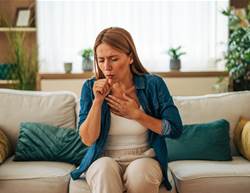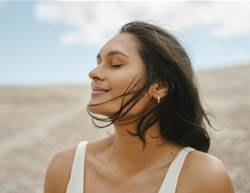It’s safe to say that the past 12 months have been pretty momentous for Mackenzie Arnold. The legendary Matildas goalkeeper and West Ham United captain not only helped to change the course of women’s sport throughout the 2023 FIFA Women’s World Cup, but she and her team recently played in the Paris Olympics.
And while Australia has been cheering her along throughout many of the iconic moments of the past year (who can ever forget those nerve-wracking penalty shoot-out saves in the World Cup quarter-final match against France?), it’s a more personal triumph that Mackenzie is now wanting to share with the world – her successful journey to hearing health.
Even from her earliest years, Mackenzie was no stranger to hearing loss. Her elder brother, Sam, was diagnosed with significant hearing loss when he was about two years old. But being witness to his more profound hearing issues meant Mackenzie brushed off her own hearing matters when they started to emerge.
“My friends started picking up on my hearing loss when I was about 16,” the 30-year-old Gold Coast native tells Prevention. “I was asking them to repeat things quite a bit in conversations, things like that. But I was in denial about it. I always compared my hearing to my brother’s and I knew how much he struggled when he didn’t have his hearing aids in. I guess I just put it down to: you can either hear or you can’t.”
Unmasking hearing loss
But when Covid-19 hit and mask-wearing became the norm, Mackenzie was confronted with the extent of her inability to communication effectively. “I obviously couldn’t lip read as much as I realised I probably was,” she explains. “That was probably the biggest trigger for me in starting my hearing loss journey.”
Like many other people experiencing hearing loss, Mackenzie was unsure of where to start and daunted by the idea of getting tested, so she turned to her brother for advice. “He helped to find a hearing centre for me in London, where I was living at the time, and I went and got my hearing checked. So, that was the first step.”
Following that hearing test, Mackenzie was told she needed hearing treatment for what was most probably hereditary hearing loss, given she and her brother share similarities in the type of hearing loss they have.
“It’s more of a high frequency [issue],” she explains. “I can hear vowels quite easily because they’re more of a deeper tone, but I struggle more to hear consonants and sounds like ‘th’ and ‘sh’.”
Making sense
Mackenzie says the benefits of receiving hearing treatment were felt immediately – she could suddenly hear the sound of rain outside that she wasn’t able to notice just moments before. But, she adds, it’s the longer-term effects that have been the most profound.
“It’s made me a lot more confident in social settings,” she says. “Before I got treatment, I withdrew quite a bit in different environments, when the background noise was loud. I found it hard to keep up with conversation. But now I don’t hesitate to join the conversation without being stressed about asking people to repeat themselves or not being able to follow.”
Mackenzie admits her brother’s influence was instrumental in encouraging her to get her hearing checked – and also for giving her a first-hand appreciation for how much hearing aids have evolved from bulky contraptions to discreet, barely visible devices. She now hopes to be that same positive influence for others.
“I hope people can potentially look at my journey – especially younger kids coming through and playing sport – and take away the stigma of being too worried to seek treatment,” she says. “At the end of the day, it’s the first step to improving your quality of life.”
And while the Matildas didn’t win a medal at the Paris Olympics, Mackenzie sums it up nicely on her Instagram post: “We’ll come back from this stronger.”
Audika Hearing Clinic is encouraging all Australians over 26 to ‘Love Your Ears’ by visiting their closest centre for a free hearing check, or take the five-minute online hearing check.










